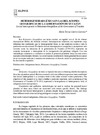Identificador persistente para citar o vincular este elemento:
https://accedacris.ulpgc.es/jspui/handle/10553/53112
| Título: | Heterogeneidad léxica en las relaciones geográficas de la gobernación de Yucatán | Otros títulos: | Lexical heterogeneity in relaciones geográficas of the Government of Yucatán | Autores/as: | Cáceres-Lorenzo, María Teresa | Clasificación UNESCO: | 570107 Lengua y literatura | Palabras clave: | Indigenismo léxico Relaciones geográficas Yucatán Lexical indigenisms |
Fecha de publicación: | 2016 | Publicación seriada: | Alpha | Resumen: | Las Relaciones Geográficas son textos escritos en español con el fin de obtener descripciones fiables del dominio colonial. Investigaciones anteriores con repertorios muy diferentes han establecido que la heterogeneidad léxica es una tendencia común a toda la producción escrita colonial. El objetivo de esta investigación es comprobar si un repertorio más concreto como las relaciones de la gobernación de Yucatán (1579-1581) representa un conjunto homogéneo o heterogéneo en la incorporación del préstamo indígena. Con una metodología cuantitativa y cualitativa se analiza la potencial pluralidad léxica de estos textos asociada a determinados factores. Las conclusiones corroboran la heterogeneidad léxica a pesar de ser un corpus uniforme y muestran tres tendencias a la hora de incluir los prehispanismos en los documentos españoles. Relaciones Geográficas are texts in Spanish that aim at obtaining reliable descriptions from the colonialism period. Previous research with very different repertoires have established that lexical heterogeneity is a common trend in the entire colonial written production. The objective of this research is to check whether a particular repertoire, such as relations of the Government of Yucatán (1579-1581) represents a homogeneous or heterogeneous body of indigenous loans incorporation. Quantitative and qualitative methodologies are used to analyse the potential lexical plurality of these texts which are associated with certain specific factors. The findings corroborate that lexical heterogeneity is present, despite being a uniform corpus, and show three different trends when including prehispanic concepts in Spanish documents. |
URI: | https://accedacris.ulpgc.es/handle/10553/21221 | ISSN: | 0716-4254 | DOI: | 10.4067/S0718-22012016000100007 | Fuente: | Alpha [ISSN 0718-2201], n. 42, p. 93-108 | Derechos: | by-nc-nd |
| Colección: | Artículos |
Citas SCOPUSTM
1
actualizado el 08-jun-2025
Visitas
27
actualizado el 10-ene-2026
Descargas
11
actualizado el 10-ene-2026
Google ScholarTM
Verifica
Altmetric
Comparte
Exporta metadatos
Los elementos en ULPGC accedaCRIS están protegidos por derechos de autor con todos los derechos reservados, a menos que se indique lo contrario.
